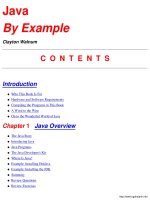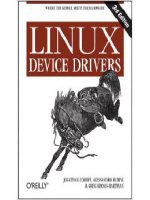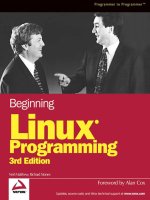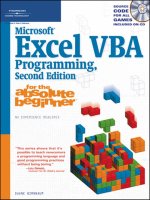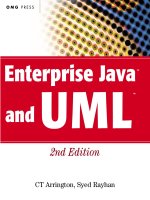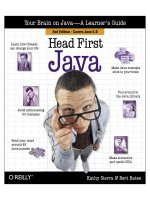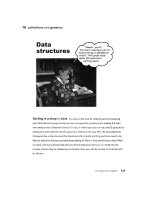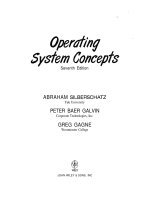Thinking in Java 3rd Edition phần 1 ppsx
Bạn đang xem bản rút gọn của tài liệu. Xem và tải ngay bản đầy đủ của tài liệu tại đây (1.58 MB, 78 trang )
Thinking in Java,
3
rd
Edition, Beta
Bruce Eckel, President,
MindView, Inc.
Planet PDF brings you the Portable Document
Format (PDF) version of Thinking in Java. Planet
PDF is the premier PDF-related site on the web.
There is news, software, white papers, interviews,
product reviews, code samples, a forum, and
regular articles by many of the most prominent and
respected PDF experts in the world. Visit our sites
for more detail:
/>
/>
/>
Click here to buy the paper version
Note: This document requires the installation of the fonts Georgia,
Verdana and Andale Mono (code font) for proper viewing. These can be
found at:
Modifications in Revision 3.0 (unreleased)
• Reorganized chapters into their final form and numbering. Split
chapter 1 by moving “Analysis and design” to Chapter 16.
• Modified the description of the chapters in the introduction. (This
needs to be revisited again.
• Finished threading chapter. Dining philosophers problem added
to threading chapter.
• Edited/rewrote chapters 1 - 11, 14 and Appendix A, B & D, which
went to production.
• Added Applet Signing and Java Web Start sections to “Creating
Windows and Applets.”
• Added examples showing threading in “Creating Windows and
Applets.”
• Added improved access control to most classes (more private
fields, in particular).
• Made general improvements throughout the code base.
• Changed cleanup( ) to dispose( )
• Changed “friendly” to “package access”
• Changed “function” to “method” most places
• Added Preferences API section
• Removed Microsoft EULA (no longer needed for CD)
• Rewrote c14:ShowAddListeners.java to use regular expressions;
refactored
• Renamed “death condition” to “termination condition”
Modifications in Revision 2.0 (9/13/2002)
• Completed part of the rewrite of the threading chapter. This
simplifies the introduction to threading and removes all the GUI
examples, so that the threading chapter may be moved to appear
earlier in the book.
• Reorganized material into reasonably final form, and assigned
chapter numbers. Chapters may still migrate.
• Finished com.bruceeckel.simpletest framework and
integrated all test-instrumented examples back into the main
book. Added prose for testing system in Chapter 15. Also updated
most examples in book to reflect improvements in testing system.
Note: we are still refactoring this code to make it simpler. Stay
tuned.
• Added sections on JDK 1.4 assertions, including design-by-
contract, to chapter 15.
• Added JUnit introduction and example to chapter 15.
• Changed “static inner class” to “nested class.”
• Modified c04:Garbage.java so it wouldn’t fail on fast machines,
added description.
• Moved BangBean2.java into the GUI chapter, since the non-
GUI threading chapter will now appear before the GUI chapter.
Modifications in Revision 1.0 (7/12/2002):
• Changed to email-based BackTalk system, which is much simpler
to use and may be used while reading the document offline.
• Added “Testing and Debugging” chapter, currently numbered 15.
This includes a simple testing system and an introduction to
JUnit, as well as a thorough introduction to Logging and an
introduction to using debuggers and profilers.
• Added test framework to examples in the book. Not all examples
are fully tested yet, but most are at least executed. Comment flags
on examples indicate the testing status of each. Significant change:
program output is displayed and tested directly in the source, so
readers can see what the output will actually be.
• Change to Ant as the build tool, added package statements to
disambiguate duplicate names so Ant won’t complain. Running
Ant on the book not only compiles but also runs the
aforementioned tests.
• HTML is now generated by a new tool called LogicTran
(
). Still learning to use this one, so early
versions will be a bit rough.
• Replaced Thread Group section in multithreading chapter.
• Removed JNI appendix (available in the electronic 2
nd
edition on
the CD or via download from www.MindView.net)
• Removed Jini section (available in the electronic 2
nd
edition on the
CD or via download from www.MindView.net)
• Removed Corba section (available in the electronic 2
nd
edition on
the CD or via download from www.MindView.net) after talking to
Dave Bartlett (Corba & XML expert), who observed that Corba has
gone quiet and everyone has gone up a level to the use of XML for
system integration instead of Corba.
• Made a number of technical corrections suggested over the last 2
years. Most suggestions have been archived but not made yet.
Todo:
• Add “cloud of teachers, mentors, consultants” re: Larry’s
suggestion
• Check for double spaces in text, replace ( ) with ( ), correct em-
dashes – with —
• Preface
• Index
Thinking
in
Java
Third Edition
Bruce Eckel
President, MindView, Inc.
Comments from readers:
Much better than any other Java book I’ve seen. Make that “by an order of
magnitude” very complete, with excellent right-to-the-point examples
and intelligent, not dumbed-down, explanations In contrast to many
other Java books I found it to be unusually mature, consistent,
intellectually honest, well-written and precise. IMHO, an ideal book for
studying Java. Anatoly Vorobey, Technion University, Haifa,
Israel
One of the absolutely best programming tutorials I’ve seen for any
language. Joakim Ziegler, FIX sysop
Thank you for your wonderful, wonderful book on Java. Dr. Gavin
Pillay, Registrar, King Edward VIII Hospital, South Africa
Thank you again for your awesome book. I was really floundering (being a
non-C programmer), but your book has brought me up to speed as fast as
I could read it. It’s really cool to be able to understand the underlying
principles and concepts from the start, rather than having to try to build
that conceptual model through trial and error. Hopefully I will be able to
attend your seminar in the not-too-distant future. Randall R. Hawley,
Automation Technician, Eli Lilly & Co.
The best computer book writing I have seen. Tom Holland
This is one of the best books I’ve read about a programming language…
The best book ever written on Java. Ravindra Pai, Oracle
Corporation, SUNOS product line
This is the best book on Java that I have ever found! You have done a
great job. Your depth is amazing. I will be purchasing the book when it is
published. I have been learning Java since October 96. I have read a few
books, and consider yours a “MUST READ.” These past few months we
have been focused on a product written entirely in Java. Your book has
helped solidify topics I was shaky on and has expanded my knowledge
base. I have even used some of your explanations as information in
interviewing contractors to help our team. I have found how much Java
knowledge they have by asking them about things I have learned from
reading your book (e.g., the difference between arrays and Vectors). Your
book is great! Steve Wilkinson, Senior Staff Specialist, MCI
Telecommunications
Great book. Best book on Java I have seen so far. Jeff Sinclair,
Software Engineer, Kestral Computing
Thank you for Thinking in Java. It’s time someone went beyond mere
language description to a thoughtful, penetrating analytic tutorial that
doesn’t kowtow to The Manufacturers. I’ve read almost all the others—
only yours and Patrick Winston’s have found a place in my heart. I’m
already recommending it to customers. Thanks again. Richard Brooks,
Java Consultant, Sun Professional Services, Dallas
Bruce, your book is wonderful! Your explanations are clear and direct.
Through your fantastic book I have gained a tremendous amount of Java
knowledge. The exercises are also FANTASTIC and do an excellent job
reinforcing the ideas explained throughout the chapters. I look forward to
reading more books written by you. Thank you for the tremendous service
that you are providing by writing such great books. My code will be much
better after reading Thinking in Java. I thank you and I'm sure any
programmers who will have to maintain my code are also grateful to you.
Yvonne Watkins, Java Artisan, Discover Technologies, Inc.
Other books cover the WHAT of Java (describing the syntax and the
libraries) or the HOW of Java (practical programming examples).
Thinking in Java is the only book I know that explains the WHY of Java;
why it was designed the way it was, why it works the way it does, why it
sometimes doesn’t work, why it’s better than C++, why it’s not. Although
it also does a good job of teaching the what and how of the language,
Thinking in Java is definitely the thinking person’s choice in a Java book.
Robert S. Stephenson
Thanks for writing a great book. The more I read it the better I like it. My
students like it, too. Chuck Iverson
I just want to commend you for your work on Thinking in Java. It is
people like you that dignify the future of the Internet and I just want to
thank you for your effort. It is very much appreciated. Patrick Barrell,
Network Officer Mamco, QAF Mfg. Inc.
Most of the Java books out there are fine for a start, and most just have
beginning stuff and a lot of the same examples. Yours is by far the best
advanced thinking book I’ve seen. Please publish it soon! I also bought
Thinking in C++ just because I was so impressed with Thinking in Java.
George Laframboise, LightWorx Technology Consulting, Inc.
I wrote to you earlier about my favorable impressions regarding your
Thinking in C++ (a book that stands prominently on my shelf here at
work). And today I’ve been able to delve into Java with your e-book in my
virtual hand, and I must say (in my best Chevy Chase from Modern
Problems) “I like it!” Very informative and explanatory, without reading
like a dry textbook. You cover the most important yet the least covered
concepts of Java development: the whys. Sean Brady
I develop in both Java and C++, and both of your books have been
lifesavers for me. If I am stumped about a particular concept, I know that
I can count on your books to a) explain the thought to me clearly and b)
have solid examples that pertain to what I am trying to accomplish. I have
yet to find another author that I continually whole-heartedly recommend
to anyone who is willing to listen. Josh Asbury, A^3 Software
Consulting, Cincinnati, OH
Your examples are clear and easy to understand. You took care of many
important details of Java that can’t be found easily in the weak Java
documentation. And you don’t waste the reader’s time with the basic facts
a programmer already knows. Kai Engert, Innovative Software,
Germany
I’m a great fan of your Thinking in C++ and have recommended it to
associates. As I go through the electronic version of your Java book, I’m
finding that you’ve retained the same high level of writing. Thank you!
Peter R. Neuwald
VERY well-written Java book I think you’ve done a GREAT job on it. As
the leader of a Chicago-area Java special interest group, I’ve favorably
mentioned your book and Web site several times at our recent meetings. I
would like to use Thinking in Java as the basis for a part of each monthly
SIG meeting, in which we review and discuss each chapter in succession.
Mark Ertes
By the way, printed TIJ2 in Russian is still selling great, and remains
bestseller. Learning Java became synonym of reading TIJ2, isn't that
nice? Ivan Porty, translator and publisher of Thinking In Java
2nd Edition in Russian
I really appreciate your work and your book is good. I recommend it here
to our users and Ph.D. students. Hugues Leroy // Irisa-Inria Rennes
France, Head of Scientific Computing and Industrial Tranfert
OK, I’ve only read about 40 pages of Thinking in Java, but I’ve already
found it to be the most clearly written and presented programming book
I’ve come across and I’m a writer, myself, so I am probably a little
critical. I have Thinking in C++ on order and can’t wait to crack it—I’m
fairly new to programming and am hitting learning curves head-on
everywhere. So this is just a quick note to say thanks for your excellent
work. I had begun to burn a little low on enthusiasm from slogging
through the mucky, murky prose of most computer books—even ones that
came with glowing recommendations. I feel a whole lot better now.
Glenn Becker, Educational Theatre Association
Thank you for making your wonderful book available. I have found it
immensely useful in finally understanding what I experienced as
confusing in Java and C++. Reading your book has been very satisfying.
Felix Bizaoui, Twin Oaks Industries, Louisa, Va.
I must congratulate you on an excellent book. I decided to have a look at
Thinking in Java based on my experience with Thinking in C++, and I
was not disappointed. Jaco van der Merwe, Software Specialist,
DataFusion Systems Ltd, Stellenbosch, South Africa
This has to be one of the best Java books I’ve seen. E.F. Pritchard,
Senior Software Engineer, Cambridge Animation Systems Ltd.,
United Kingdom
Your book makes all the other Java books I’ve read or flipped through
seem doubly useless and insulting. Brett g Porter, Senior
Programmer, Art & Logic
I have been reading your book for a week or two and compared to the
books I have read earlier on Java, your book seems to have given me a
great start. I have recommended this book to a lot of my friends and they
have rated it excellent. Please accept my congratulations for coming out
with an excellent book. Rama Krishna Bhupathi, Software
Engineer, TCSI Corporation, San Jose
Just wanted to say what a “brilliant” piece of work your book is. I’ve been
using it as a major reference for in-house Java work. I find that the table
of contents is just right for quickly locating the section that is required.
It’s also nice to see a book that is not just a rehash of the API nor treats
the programmer like a dummy. Grant Sayer, Java Components
Group Leader, Ceedata Systems Pty Ltd, Australia
Wow! A readable, in-depth Java book. There are a lot of poor (and
admittedly a couple of good) Java books out there, but from what I’ve
seen yours is definitely one of the best. John Root, Web Developer,
Department of Social Security, London
I’ve just started Thinking in Java. I expect it to be very good because I
really liked Thinking in C++ (which I read as an experienced C++
programmer, trying to stay ahead of the curve). I’m somewhat less
experienced in Java, but expect to be very satisfied. You are a wonderful
author. Kevin K. Lewis, Technologist, ObjectSpace, Inc.
I think it’s a great book. I learned all I know about Java from this book.
Thank you for making it available for free over the Internet. If you
wouldn’t have I’d know nothing about Java at all. But the best thing is
that your book isn’t a commercial brochure for Java. It also shows the bad
sides of Java. YOU have done a great job here. Frederik Fix, Belgium
I have been hooked to your books all the time. A couple of years ago, when
I wanted to start with C++, it was C++ Inside & Out which took me
around the fascinating world of C++. It helped me in getting better
opportunities in life. Now, in pursuit of more knowledge and when I
wanted to learn Java, I bumped into Thinking in Java—no doubts in my
mind as to whether I need some other book. Just fantastic. It is more like
rediscovering myself as I get along with the book. It is just a month since I
started with Java, and heartfelt thanks to you, I am understanding it
better now. Anand Kumar S., Software Engineer,
Computervision, India
Your book stands out as an excellent general introduction. Peter
Robinson, University of Cambridge Computer Laboratory
It’s by far the best material I have come across to help me learn Java and I
just want you to know how lucky I feel to have found it. THANKS! Chuck
Peterson, Product Leader, Internet Product Line, IVIS
International
The book is great. It’s the third book on Java I’ve started and I’m about
two-thirds of the way through it now. I plan to finish this one. I found out
about it because it is used in some internal classes at Lucent Technologies
and a friend told me the book was on the Net. Good work. Jerry Nowlin,
MTS, Lucent Technologies
Of the six or so Java books I’ve accumulated to date, your Thinking in
Java is by far the best and clearest. Michael Van Waas, Ph.D.,
President, TMR Associates
I just want to say thanks for Thinking in Java. What a wonderful book
you’ve made here! Not to mention downloadable for free! As a student I
find your books invaluable (I have a copy of C++ Inside Out, another great
book about C++), because they not only teach me the how-to, but also the
whys, which are of course very important in building a strong foundation
in languages such as C++ or Java. I have quite a lot of friends here who
love programming just as I do, and I’ve told them about your books. They
think it’s great! Thanks again! By the way, I’m Indonesian and I live in
Java. Ray Frederick Djajadinata, Student at Trisakti University,
Jakarta
The mere fact that you have made this work free over the Net puts me into
shock. I thought I’d let you know how much I appreciate and respect what
you’re doing. Shane LeBouthillier, Computer Engineering
student, University of Alberta, Canada
I have to tell you how much I look forward to reading your monthly
column. As a newbie to the world of object oriented programming, I
appreciate the time and thoughtfulness that you give to even the most
elementary topic. I have downloaded your book, but you can bet that I will
purchase the hard copy when it is published. Thanks for all of your help.
Dan Cashmer, B. C. Ziegler & Co.
Just want to congratulate you on a job well done. First I stumbled upon
the PDF version of Thinking in Java. Even before I finished reading it, I
ran to the store and found Thinking in C++. Now, I have been in the
computer business for over eight years, as a consultant, software
engineer, teacher/trainer, and recently as self-employed, so I’d like to
think that I have seen enough (not “have seen it all,” mind you, but
enough). However, these books cause my girlfriend to call me a ”geek.”
Not that I have anything against the concept—it is just that I thought this
phase was well beyond me. But I find myself truly enjoying both books,
like no other computer book I have touched or bought so far. Excellent
writing style, very nice introduction of every new topic, and lots of
wisdom in the books. Well done. Simon Goland,
, Simon Says Consulting, Inc.
I must say that your Thinking in Java is great! That is exactly the kind of
documentation I was looking for. Especially the sections about good and
poor software design using Java. Dirk Duehr, Lexikon Verlag,
Bertelsmann AG, Germany
Thank you for writing two great books (Thinking in C++, Thinking in
Java). You have helped me immensely in my progression to object
oriented programming. Donald Lawson, DCL Enterprises
Thank you for taking the time to write a really helpful book on Java. If
teaching makes you understand something, by now you must be pretty
pleased with yourself. Dominic Turner, GEAC Support
It’s the best Java book I have ever read—and I read some. Jean-Yves
MENGANT, Chief Software Architect NAT-SYSTEM, Paris,
France
Thinking in Java gives the best coverage and explanation. Very easy to
read, and I mean the code fragments as well. Ron Chan, Ph.D., Expert
Choice, Inc., Pittsburgh PA
Your book is great. I have read lots of programming books and your book
still adds insights to programming in my mind. Ningjian Wang,
Information System Engineer, The Vanguard Group
Thinking in Java is an excellent and readable book. I recommend it to all
my students. Dr. Paul Gorman, Department of Computer Science,
University of Otago, Dunedin, New Zealand
With your book, I have now understood what object oriented
programming means. I believe that Java is much more straightforward
and often even easier than Perl. Torsten Römer, Orange Denmark
You make it possible for the proverbial free lunch to exist, not just a soup
kitchen type of lunch but a gourmet delight for those who appreciate good
software and books about it. Jose Suriol, Scylax Corporation
Thanks for the opportunity of watching this book grow into a masterpiece!
IT IS THE BEST book on the subject that I’ve read or browsed. Jeff
Lapchinsky, Programmer, Net Results Technologies
Your book is concise, accessible and a joy to read. Keith Ritchie, Java
Research & Development Team, KL Group Inc.
It truly is the best book I’ve read on Java! Daniel Eng
The best book I have seen on Java! Rich Hoffarth, Senior Architect,
West Group
Thank you for a wonderful book. I’m having a lot of fun going through the
chapters. Fred Trimble, Actium Corporation
You have mastered the art of slowly and successfully making us grasp the
details. You make learning VERY easy and satisfying. Thank you for a
truly wonderful tutorial. Rajesh Rau, Software Consultant
Thinking in Java rocks the free world! Miko O’Sullivan, President,
Idocs Inc.
Feedback
About Thinking in C++:
Best Book! Winner of the
1995 Software Development Magazine Jolt Award!
“This book is a tremendous achievement. You owe it to yourself to
have a copy on your shelf. The chapter on iostreams is the most
comprehensive and understandable treatment of that subject I’ve seen
to date.”
Al Stevens
Contributing Editor, Doctor Dobbs Journal
“Eckel’s book is the only one to so clearly explain how to rethink
program construction for object orientation. That the book is also an
excellent tutorial on the ins and outs of C++ is an added bonus.”
Andrew Binstock
Editor, Unix Review
“Bruce continues to amaze me with his insight into C++, and Thinking
in C++ is his best collection of ideas yet. If you want clear answers to
difficult questions about C++, buy this outstanding book.”
Gary Entsminger
Author, The Tao of Objects
“Thinking in C++ patiently and methodically explores the issues of
when and how to use inlines, references, operator overloading,
inheritance, and dynamic objects, as well as advanced topics such as
the proper use of templates, exceptions and multiple inheritance. The
entire effort is woven in a fabric that includes Eckel’s own philosophy
of object and program design. A must for every C++ developer’s
bookshelf, Thinking in C++ is the one C++ book you must have if
you’re doing serious development with C++.”
Richard Hale Shaw
Contributing Editor, PC Magazine
Thinking
in
Java
Third Edition
Bruce Eckel
President, MindView, Inc.
Prentice Hall
Upper Saddle River, New Jersey 07458
www.phptr.com
Library of Congress Cataloging-in-Publication Data
Eckel, Bruce.
Thinking in Java / Bruce Eckel 3rd ed.
p. cm.
ISBN 0-13-100287-2
1. Java (Computer program language) I. Title.
QA76.73.J38E25 2003
005.13'3 dc21 00-037522
CIP
Acquisitions Editor: Paul Petralia
Editorial/Production Supervision: Nicholas Radhuber
Manufacturing Manager: Maura Zaldivar
Marketing Manager: Bryan Gambrel
Cover Design: Daniel Will-Harris
Interior Design: Daniel Will-Harris, www.will-harris.com
©2003 by Bruce Eckel, President, MindView, Inc.
Published by Pearson Education, Inc.
Publishing as Prentice Hall PTR
Upper Saddle River, NJ 07458
The information in this book is distributed on an “as is” basis, without warranty. While every precaution
has been taken in the preparation of this book, neither the author nor the publisher shall have any liability
to any person or entitle with respect to any liability, loss or damage caused or alleged to be caused directly
or indirectly by instructions contained in this book or by the computer software or hardware products
described herein.
All rights reserved. No part of this book may be reproduced, in any form or by any means, without
permission in writing from the publisher.
Prentice Hall books are widely used by corporations and government agencies for training, marketing, and
resale. The publisher offers discounts on this book when ordered in bulk quantities. For more information,
contact the Corporate Sales Department at 800-382-3419, fax: 201-236-7141, email:
or write: Corporate Sales Department, Prentice Hall PTR, One Lake Street,
Upper Saddle River, New Jersey 07458.
Java is a registered trademark of Sun Microsystems, Inc. Windows 95, Windows NT, Windows 2000 and
Windows XP are trademarks of Microsoft Corporation. All other product names and company names
mentioned herein are the property of their respective owners.
Printed in the United States of America
10 9 8 7 6 5 4 3 2 1
ISBN 0-13-027363-5
Pearson Education LTD.
Pearson Education Australia PTY, Limited
Pearson Education Singapore, Pte. Ltd
Pearson Education North Asia Ltd
Pearson Education Canada, Ltd.
Pearson Educación de Mexico, S.A. de C.V.
Pearson Education-Japan
Pearson Education Malaysia, Pte. Ltd
Check www.BruceEckel.com
for in-depth details
and the date and location
of the next
Hands-On Java Seminar
• Based on this book
• Taught by the best MindView team members
• Personal attention during the seminar
• Includes in-class programming exercises
• Intermediate/Advanced seminars also offered
• Hundreds have already enjoyed this seminar—
see the Web site for their testimonials
Bruce Eckel’s Hands-On Java Seminar
Multimedia CD: 3
rd
edition follows this book
It’s like coming to the seminar!
Available at www.BruceEckel.com
The Hands-On Java Seminar captured on a Multimedia CD!
Overhead slides and synchronized audio voice narration for all
the lectures. Just play it to see and hear the lectures!
Created and narrated by Bruce Eckel.
Based on the material in this book.
Demo lecture available at www.BruceEckel.com
Dedication
To the person who, even now,
is creating the next great computer language
Overview
Preface 1
Introduction 11
1: Introduction to Objects 35
2: Everything is an Object 85
3: Controlling Program Flow 117
4: Initialization & Cleanup 177
5: Hiding the Implementation 231
6: Reusing Classes 257
7: Polymorphism 297
8: Interfaces & Inner Classes 335
9: Error Handling with Exceptions 395
10: Detecting types 449
11: Collections of Objects 481
12: The Java I/O System 615
13: Concurrency 709
14: Creating Windows & Applets 779
15: Discovering problems 929
16: Analysis and design 1023
A: Passing & Returning Objects 1049
B: Java Programming Guidelines 1101
C: Supplements 1117
D: Resources 1121
Index 1129
What’s Inside
Preface 1
Preface to the 3
rd
edition 4
Preface to the 2
nd
editionError! Bookmark not defined.
Java 2 6
The CD ROM 8
Introduction 11
Prerequisites 12
Learning Java 12
Goals 13
JDK HTML documentation15
Chapters 15
Exercises 22
Multimedia CD ROM 23
Source code 23
Coding standards 25
Java versions 26
Seminars and mentoring 26
Errors 27
Note on the cover design 27
Acknowledgements 28
1: Introduction to Objects 35
The progress of abstraction36
An object has an interface.39
An object provides services41
The hidden implementation43
Reusing the implementation45
Inheritance: reusing the
interface 46
Is-a vs. is-like-a relationships 50
Interchangeable objects
with polymorphism 52
Abstract base classes and interfaces56
Object creation, use &
lifetimes 57
Collections and iterators 58
The singly rooted hierarchy 60
Downcasting vs. templates/generics62
Ensuring proper cleanup 63
Exception handling: dealing
with errors 65
Concurrency 66
Persistence 67
Java and the Internet 68
What is the Web? 68
Client-side programming 70
Server-side programming 78
Applications 79
Why Java succeeds 79
Systems are easier to express and
understand 80
Maximal leverage with libraries 80
Error handling 80
Programming in the large 81
Java vs. C++? 81
Summary 83
2: Everything is an Object 85
You manipulate objects with
references 85
You must create all the
objects 87
Where storage lives 87
Special case: primitive types 89
Arrays in Java 91
You never need to destroy
an object 91
Scoping 92
Scope of objects 93
Creating new data types:
class 94
Fields and methods 94
Methods, arguments, and
return values 96
The argument list 98
Building a Java program 99
Name visibility 99
Using other components 100
The static keyword 101
Your first Java program 103
Compiling and running 105
Comments and embedded
documentation 106
Comment documentation 107
Syntax 108
Embedded HTML 109
Some example tags 110
Documentation example 112
Coding style 113
Summary 114
Exercises 114
3: Controlling Program Flow
117
Using Java operators 117
Precedence 118
Assignment 118
Mathematical operators 122
Auto increment and decrement 126
Relational operators 127
Logical operators 129
Bitwise operators 132
Shift operators 134
Ternary if-else operator 138
The comma operator 139
String operator + 139
Common pitfalls when using
operators 140
Casting operators 141
Java has no “sizeof” 144
Precedence revisited 145
A compendium of operators 145
Execution control 156
true and false 156
if-else 157
return 158
Iteration 159
do-while 160
for 160
break and continue 163
switch 170
Summary 174
Exercises 175
4: Initialization & Cleanup
177
Guaranteed initialization
with the constructor 177
Method overloading 180
Distinguishing overloaded methods183
Overloading with primitives 184
Overloading on return values 190
Default constructors 190
The this keyword 191
Cleanup: finalization and
garbage collection 196
What is finalize( ) for? 197
You must perform cleanup 198
The termination condition 199
How a garbage collector works 201
Member initialization 205
Specifying initialization 206
Constructor initialization 208
Array initialization 216
Multidimensional arrays 222
Summary 225
Exercises 226
5: Hiding the
Implementation 231
package: the library unit .232
Creating unique package names 235
A custom tool library 239
Using imports to change behavior240
Package caveat 241
Java access specifiers 241
Package access 241
public: interface access 242
private: you can’t touch that! 244
protected: inheritance access 246
Interface and
implementation 248
Class access 250
Summary 253
Exercises 255
6: Reusing Classes 257
Composition syntax 257
Inheritance syntax 261
Initializing the base class 264
Combining composition and
inheritance 267
Guaranteeing proper cleanup 269
Name hiding 273
Choosing composition vs.
inheritance 274
protected 276
Incremental development278
Upcasting 279
Why “upcasting”? 280
The final keyword 281
Final data 281
Final methods 286
Final classes 289
Final caution 290
Initialization and class
loading 291
Initialization with inheritance 291
Summary 293
Exercises 294
7: Polymorphism 297
Upcasting revisited 297
Forgetting the object type 300
The twist 301
Method-call binding 302
Producing the right behavior 303
Extensibility 306
Pitfall: “overriding” private
methods 310
Abstract classes and
methods 311
Constructors and
polymorphism 315
Order of constructor calls 316
Inheritance and cleanup 318
Behavior of polymorphic methods
inside constructors 322
Designing with inheritance325
Pure inheritance vs. extension 326
Downcasting and run time type
identification 329
Summary 331
Exercises 331
8: Interfaces & Inner Classes
335
Interfaces 335
“Multiple inheritance” in Java 340
Extending an interface with
inheritance 344
Grouping constants 345
Initializing fields in interfaces 348
Nesting interfaces 349
Inner classes 352
Inner classes and upcasting 354
Inner classes in methods and
scopes 356
Anonymous inner classes 359
The link to the outer class 363
Nested classes 366
Referring to the outer class object368
Reaching outward from a multiply-
nested class 370
Inheriting from inner classes 371
Can inner classes be overridden?371
Local inner classes 374
Inner class identifiers 376
Why inner classes? 376
Closures & Callbacks 379
Inner classes & control frameworks382
Summary 390
Exercises 390
9: Error Handling with
Exceptions 395
Basic exceptions 396
Exception arguments 397
Catching an exception 398
The try block 399
Exception handlers 399
Creating your own
exceptions 401
The exception specification405
Catching any exception 407
Rethrowing an exception 409
Exception chaining 413
Standard Java exceptions 417
The special case of
RuntimeException 417
Performing cleanup with
finally 420
What’s finally for? 421
Pitfall: the lost exception 424
Exception restrictions 426
Constructors 429
Exception matching 433
Alternative approaches 435
History 436
Perspectives 438
Passing exceptions to the console441
Converting checked to unchecked
exceptions 442
Exception guidelines 445
Summary 445
Exercises 446
10: Detecting types 449
The need for RTTI 449
The Class object 452
Checking before a cast 456
RTTI syntax 468
Reflection: run time class
information 471
A class method extractor 473
Summary 477
Exercises 478
11: Collections of Objects
481
Arrays 481
Arrays are first-class objects 483
Returning an array 487
The Arrays class 489
Filling an array 497
Copying an array 499
Comparing arrays 500
